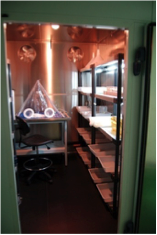Description
Material provided: Personalized training for end-users
Unit definition: 1 week of access
Biosafety Level: CL2/CL3
Installation name: Centre de Recerca en Sanitat Animal (CReSA)
Website: CReSA
Description of the facility
The Centre de Recerca en Sanitat Animal (CReSA) is a research centre integrated within the Institute for Research and Technology on Food and Agriculture (IRTA). CReSA’s mandate includes conducting research in animal health, mainly focused on diseases of pigs, ruminants, poultry and zoonotic diseases transmitted by vectors. CReSA has animal (1200m2) and laboratory (300m2) CL3 facilities, and facility for insect rearing (with stable culicoides and culicidae colonies). This allows conducting experimental studies with risk group 3 infectious agents in farm animals (swine, ruminants, poultry) as well as in laboratory animals (rodents, rabbits, ferrets), and vector (culicoide and culicids) studies.
IRTA is involved in both research and surveillance activities dealing with different arboviral diseases as Bluetongue, Schmallenberg, West Nile, Rift Valley, Dengue, Chikungunya or Zika. Current surveillance activities are based on virological and entomological surveillance programs for arboviruses performed in Catalonia (NE Spain).
In parallel to scientific interest, CReSA carries out different initiatives for companies, and for the government departments of the Generalitat de Catalunya with competencies in animal and public health. CReSA is an unique scientific and technical infrastructure and has participated in Open Access activities for companies and for European projects such as the Network of Animal Disease Research Facilities (NADIR) of the 7th EU Framework Program and its further development, named VetBioNet (a currently running EU project, H2020-INFRAIA-01-2016-2017, grant agreement No 731014). In the last 3 years, CReSA’s infrastructure has been hosting between 8 and 12 International users.
Available vectors
Training will be conducted with INFRAVEC2-distributed Aedes albopictus and Culex pipiens colony established at our installation.
Course overview
A personalized (1-2 persons) 5-day theoretical and practical laboratory-based course will provide a necessary background to successfully plan, design, and conduct insect infection studies with Risk Group (RG) 2 and RG3 pathogens. The course is aimed at early career scientists, and/or applicants looking to strengthen their research capacity in this area. No prior entomology experience is required. To get the full value from the course, prior experience in working with human/animal pathogens in high biocontainment facilities is an advantage, but contact the organisers for more details if unsure.
The practical modules of the course will take place within the Biosafety Level (BSL) 2 and BSL3 insectaries. No infectious biological agents will be handled during the course.
Course syllabus
Theoretical modules
- Legal framework for working with insects in biological containment laboratories (including national considerations)
- Principles of risk assessment
- Facility design and operation
- Experimental design for vector competence studies and interpretation of the results
Practical modules
- Insect rearing in dedicated non-contained insectary and in high biocontainment laboratories
- Insect infection procedures: artificial blood-feeding, intrathoracic inoculation, dissection and sample collection
Equipment used
Trainees will use the following equipment:
- Biological Safety cabinet, type 2
- Climate Chamber
- Stereo microscope
- Refrigerated centrifuge
- -20°C degree freezer and refrigerator
- Refrigerated table
- Artificial feeding equipment, Hemotek
- Microinjector
For more information, please contact us.

